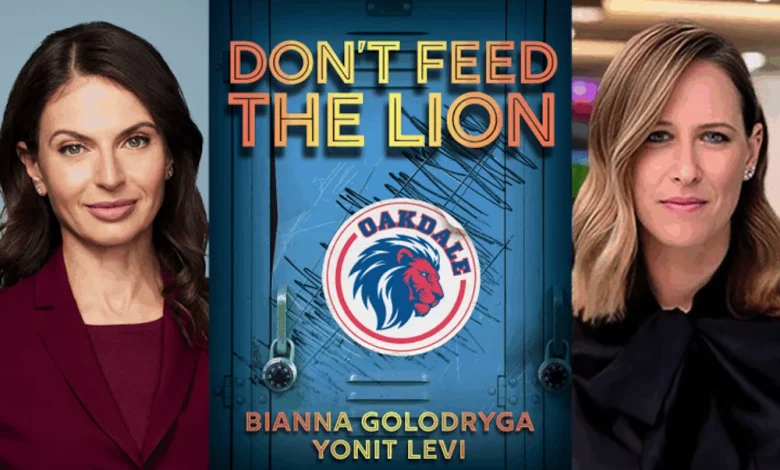Bianna Golodryga and Yonit Levi confront rising antisemitism with a story for the next generation

Long before the Oct. 7, 2023, Hamas terror attacks, parents — especially Jewish parents — wondered and at times struggled with how to speak to their children about antisemitism.
In the midst of the antisemitism that exploded in the wake of the attack on southern Israel and continued to rise through the ensuing war between Israel and Hamas, journalists Bianna Golodryga and Yonit Levi found themselves navigating that challenge — and found no help to guide them.
“The fact that our kids are talking about it, [it’s] something I’m dealing and grappling with in New York City in 2023 at the time,” Golodryga, a CNN news anchor, told Jewish Insider in a recent interview. “I never thought that we’d be having to address [it] so directly. But there were no resources on this issue. I asked my kid’s school about it, [saying], ‘What are you doing to address antisemitism?’ And in a longly worded statement, it was clear that there were no resources. They weren’t really doing anything.”
In Israel, Levi, an anchor on Israel’s Channel 12, was asked about antisemitism by her pre-teen son. “And I was sort of floored by it,” she told JI. “I didn’t even know how to begin answering because I wasn’t planning to answer that question, explaining and answering a lot of other questions that Oct. 7 brought to the table.”
As a result, Golodryga said, “Yonit and I decided to try to write the book we couldn’t find.” The result was their debut book, Don’t Feed the Lion, released on Tuesday.
After the Oct. 7 attacks, Golodryga and Levi spent much of their professional bandwidth reporting on the war. The weekly writing and brainstorming sessions for the book, Golodryga explained, were “cathartic” and provided an opportunity to “step aside and away from all of the breaking news and the heartache of the day.” For Levi, having that support system and the experience of writing the book amid so much turmoil at home was “like a ray of light inside this darkness of the last two years.”
Don’t Feed the Lion is a novel targeted to middle school students, but with lessons, scenarios and parables that anyone who has experienced or witnessed discrimination — in any of its forms — will recognize.
The book’s main plot point revolves around a pair of Jewish siblings in Chicago. The older of the two, Theo Kaplan, a soccer enthusiast and co-captain of his school’s team, is shaken when prominent soccer player Wes Mitchell goes on an antisemitic rant. Days later, the eighth grader’s teammates vandalize his gym locker with a swastika. Theo, who is weeks away from his bar mitzvah, faces inner turmoil as he grapples with the fallout of Mitchell’s comments and the responses to the incident by his friends, teammates and school administrators. (Spoiler alert: the school is more than happy to sweep the incident under the rug.)
Meanwhile, Theo’s younger sister, Annie, sneakily creates an account on a social media platform in an effort to get concert tickets, but ends up falling into a Reddit-esque black hole of antisemitic drivel, which she attempts to fight despite being far outnumbered by anonymous online trolls.
Theo finds himself an ally in Gabe, a new student who moved to Chicago after his mother’s death from COVID-19. Gabe, although an outside observer, becomes the readers’ eyes and ears into the Kaplan family when he is paired with Theo for a family heritage project that sees the two spotlight Theo’s grandparents, Ezra and Talia.
“It’s obviously a fictional book, but there are several real-life experiences that we’ve encountered, that I’ve encountered with some family members, going back several years ago, where antisemitism not only wasn’t really addressed, but when it was facing students and faculty members at schools, it wasn’t treated or given the prioritization that that other forms of hate were given,” Golodryga said.
But whereas many stories and fiction novels about Jewish families settle into tired tropes, Don’t Feed the Lion takes a more realistic approach to the American Jewish experience: Ezra and Talia are a mixed Ashkenazi-Mizrahi couple — a rarity in the world of Jewish literature. The family dynamic is challenging, with estrangement between Theo and Annie’s grandparents and their aunt’s family. And Theo faces the relatable social pressures that many young assimilated Jews encounter as they feel torn between spending Friday nights socializing with friends during a time traditionally set aside for Shabbat meals with family.
Beyond capturing the zeitgeist of the modern American Jewish family, Theo is a relatable protagonist — owing in part to Golodryga and Levi’s own children, who inspired elements of Theo’s personality, backstory and experiences. Golodryga recalled her son’s reaction to the response, in 2022, to antisemitic social media posts made by then-Brooklyn Nets star Kyrie Irving.
“It seemed like everyone was apologizing for him but him, and he was allowed to play,” she explained. Irving was ultimately suspended for eight games, more than a week after the initial social media post, after repeated opportunities in which he had refused to distance himself from the content of the post. NBA heavyweights, including LeBron James and Jaylen Brown, a vice president in the NBA’s players’ union, defended Irving at the time.
Golodryga said her son didn’t know how to approach the situation. “As a New Yorker, he even said, ‘So can I not go to games? Or can that mean that I shouldn’t be a fan, or I can’t watch him anymore? He doesn’t want me to.’ So that’s always sat in the back of my mind.”
Where art perhaps most imitates life is in how administrators in the story respond to the swastika incident — not by addressing it head-on, but by hoping to sweep it under the rug, thereby avoiding the need for disciplinary action that could keep Theo’s soccer team from advancing to the state-level competition.
At the heart of the book, Levi said, is “that the kids really get what’s wrong and what’s right” — even when the adults in the room do not. “At the end of the day, it’s like the grown ups [in the book] and in reality too, sort of obfuscate … and say, ‘Maybe I shouldn’t stand up because it’s not good for my workplace, or it’s too much bureaucracy,’ or all the other things that are said in this book, and the kids at the end of the day, they know, they get what is wrong and what is right.”





